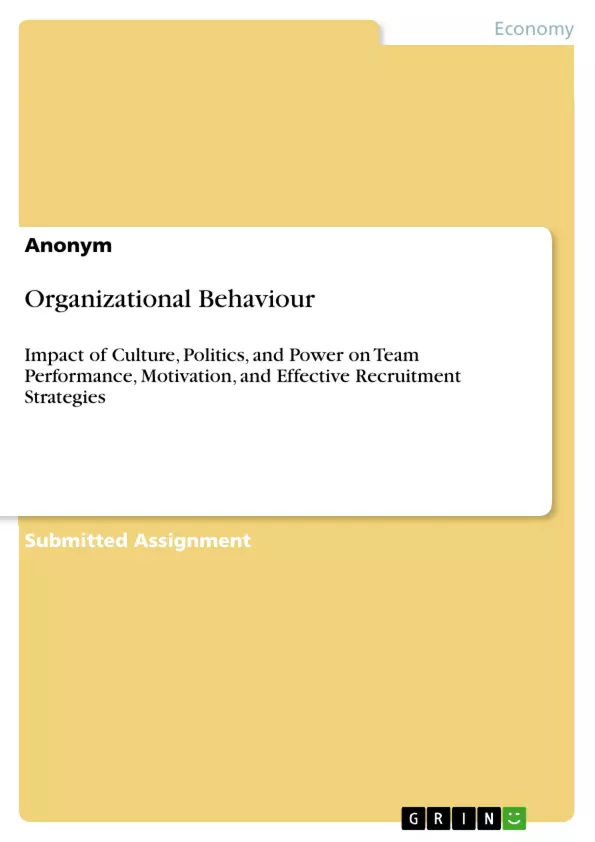Culture, politics, and power are among the most important factors that influence individual and team performance in today’s complex organizational environment. The general idea about organizational culture consisting of shared values and norms that shapes employees’ approaches to their roles, interaction, and decision-making (Buchanan & Badham, 2020). Politics and internal power relations also shape leadership practices such as how issues are decided upon by consensus, the degree of teamwork, and leadership distribution. These interconnected elements generate an intricate setup; one which can create an environment of success or be a source of conflicts leading to sub-optimal outcomes.
Inhaltsverzeichnis (Table of Contents)
- PART 1
- Question 1: The Interplay of Culture, Politics, and Power in Shaping Individual and Team Behavior Performance within Organizations
- Organizational Culture
- Organizational Politics
- Organizational Power Dynamics
- Interplay and Impact on Performance
- Question 2: Significance of Motivation Theories and Techniques in Driving Success in Organizational Goal Achievement
- Motivational Theories
- Motivation Techniques
Zielsetzung und Themenschwerpunkte (Objectives and Key Themes)
This text explores the critical role of organizational culture, politics, power dynamics, and motivation in achieving organizational goals. It examines how these interconnected elements influence individual and team performance and offers insights into effective motivational strategies.
- The impact of organizational culture, politics, and power on individual and team performance.
- The significance of motivation theories (Maslow's Hierarchy of Needs, Herzberg's Two-Factor Theory, Expectancy Theory, Goal-Setting Theory) in driving organizational success.
- Effective motivation techniques, including recognition, rewards, training, and flexible work arrangements.
- The interplay between various motivational factors and their influence on employee behavior and productivity.
- Strategies for creating a positive and productive work environment.
Zusammenfassung der Kapitel (Chapter Summaries)
PART 1: This section introduces the overarching themes of the text, focusing on the interconnectedness of organizational culture, politics, and power, and their impact on individual and team performance. It sets the stage for the subsequent exploration of motivational theories and techniques.
Question 1: The Interplay of Culture, Politics, and Power in Shaping Individual and Team Behavior Performance within Organizations: This chapter delves into the complex relationship between organizational culture, politics, and power dynamics. It examines how positive and supportive cultures foster collaboration and productivity, while toxic cultures can lead to conflict and decreased performance. The chapter also explores the influence of organizational politics, highlighting how power struggles and manipulative tactics can negatively impact team dynamics and individual well-being. Finally, it analyzes the effects of various power structures on employee behavior and innovation, emphasizing the importance of leadership style in shaping the overall work environment and its impact on success.
Question 2: Significance of Motivation Theories and Techniques in Driving Success in Organizational Goal Achievement: This chapter explores various motivation theories, including Maslow's Hierarchy of Needs, Herzberg's Two-Factor Theory, Expectancy Theory, and Goal-Setting Theory, and their practical applications in organizational settings. It discusses how these theories can be utilized to understand and address employee needs, enhance job satisfaction, and improve performance. Furthermore, it examines a range of motivation techniques, such as recognition, rewards, training, and flexible work arrangements, and their effectiveness in achieving organizational goals. The chapter emphasizes the critical role of motivation in driving organizational success in today's competitive global market.
Schlüsselwörter (Keywords)
Organizational culture, organizational politics, power dynamics, motivation theories (Maslow, Herzberg, Expectancy, Goal-Setting), motivation techniques, employee performance, team performance, organizational goal achievement, leadership styles, work environment, job satisfaction, productivity.
Häufig gestellte Fragen
What is the main topic of this text?
This text explores the interplay of organizational culture, politics, power dynamics, and motivation in driving success in organizational goal achievement.
What are the key themes explored in this text?
The key themes include: the impact of organizational culture, politics, and power on individual and team performance; the significance of motivation theories; effective motivation techniques; the interplay between motivational factors; and strategies for creating a positive work environment.
What motivation theories are discussed?
The text discusses Maslow's Hierarchy of Needs, Herzberg's Two-Factor Theory, Expectancy Theory, and Goal-Setting Theory.
What motivation techniques are mentioned?
The motivation techniques mentioned are recognition, rewards, training, and flexible work arrangements.
What does Question 1 cover?
Question 1 delves into the complex relationship between organizational culture, politics, and power dynamics and their impact on individual and team behavior performance within organizations.
What does Question 2 cover?
Question 2 explores various motivation theories and techniques and their practical applications in organizational settings.
What are some of the keywords associated with this text?
Keywords include: Organizational culture, organizational politics, power dynamics, motivation theories (Maslow, Herzberg, Expectancy, Goal-Setting), motivation techniques, employee performance, team performance, organizational goal achievement, leadership styles, work environment, job satisfaction, productivity.
What impact does organizational culture have?
Positive and supportive cultures foster collaboration and productivity, while toxic cultures can lead to conflict and decreased performance.
What is the influence of organizational politics?
Power struggles and manipulative tactics can negatively impact team dynamics and individual well-being.
How does leadership style influence the work environment?
Leadership style is important in shaping the overall work environment and its impact on success.
What is the critical role of motivation?
Motivation plays a critical role in driving organizational success in today's competitive global market.
- Quote paper
- Anonym (Author), 2024, Organizational Behaviour, Munich, GRIN Verlag, https://www.grin.com/document/1525612



